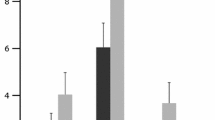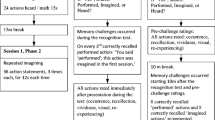Abstract
One week after committing a simulated robbery while intoxicated or sober, each of 142 subjects recalled the event within a “cognitive interview”. In an initial exploratory experiment, alcohol consumption reduced the accuracy of recall of a variety of types of information, in particular, information about persons. In the second experiment, person identification suffered following the consumption of alcohol, but only when arousal was low. Higher levels of arousal appeared instead to minimize the negative impact of alcohol upon encoding and recall. Second, whereas the recollections by subjects of what they saw during the crime were not impaired by alcohol consumption, their recollections of what they did were impaired. Both experiments examined the effects of arousal upon the subjects' recalls, and Experiment 2 tested the hypothesis that increased arousal serves to reduce attention to peripheral sources of information. This hypothesis was supported because the identification of persons central to the crime benefited from increased arousal but the identification of persons peripheral to the crime did not. A similar hypothesis about the effects of alcohol received only mixed support because the subjects' behaviors reflected “alcohol myopia” but their identifications of target persons did not. Finally, manipulations at the time of retrieval of the subjects' beliefs about how much alcohol had been consumed also altered accuracy of recall.
Similar content being viewed by others
References
Anderson, R. C., & Pichert, J. W. (1978). Recall of previously unrecallable information following a shift in perspective.Journal of Verbal Learning and Verbal Behavior,17, 1–12.
Birnbaum, I. M., & Parker, E. S. (1977). Acute effects of alcohol on storage and retrieval. In I. M. Birnbaum & E. S. Parker (Eds.).Alcohol and human memory (pp. 99–108). Hillsdale, NJ: Erlbaum.
Bothwell, R. K., Deffenbacher, K. A., & Brigham, J. C. (1987). Correlation of eyewitness accuracy and confidence: the optimality hypothesis revisited.Journal of Applied Psychology, 72, 691–695.
Carpenter, J. A. (1962). Effect of alcohol on some psychological processes: A critical review with special reference to automobile driving skill.Quarterly Journal of Studies on Alcohol, 23, 274–314.
Christianson, S-A., & Loftus, E. F. (1987). Memory for traumatic events.Applied Cognitive Psychology, 1, 225–239.
Craik, F. I. M. (1977). Similarities between the effects of aging and alcoholic intoxication on memory performance, construed within a “levels of processing” framework. In I. M. Birnbaum & E. S. Parker (Eds.),Alcohol and human memory (pp. 9–22). Hillsdale, NJ: Erlbaum.
Cutler, B. L., Penrod, S. D., & Martens, T. K. (1987). The reliability of eyewitness identification: The role of system and estimator variables.Law and Human Behavior, 11, 233–258.
Deffenbacher, K. A. (1983). The influence of arousal on reliability of testimony. In S. M. A. Lloyd-Bostock & B. R. Clifford (Eds.).Evaluating witness evidence: Recent psychological research and new perspectives (pp. 235–251). Chichester: Wiley.
Easterbrook, J. A. (1959). The effect of emotion on cue utilization and the organization of behavior.Psychological Review, 66, 183–201.
Fisher, R. P., Geiselman, R. E. & Amador, M. (1989). Field test of the cognitive interview: Enhancing the recollection of actual witnesses and victims of crime.Journal of Applied Psychology, 74, 722–727.
Geiselman, R. E. (1988). Improving eyewitness memory through mental reinstatement in context. In G. M. Davies & D. M. Thomson (Eds.),Memory in context: Context in memory. Chichester: Wiley.
Gerson, L. W. (1978). Alcohol-related acts of violence: Who was drinking and where the acts occurred.Journal of Studies on Alcohol, 39, 1294–1296.
Hastroudi, S., Parker, E. S., DiLisi, L. E., & Wyatt, R. J. (1983). On elaboration and alcohol.Journal of Verbal Learning and Verbal Behavior, 22, 164–173.
Jones, B. M. (1973). Memory impairment on the ascending and descending limbs of the blood alcohol curve.Journal of Abnormal Psychology, 82, 24–32.
Kassin, S. M. (1985). Eyewitness identification: Retrospective self-awareness and the accuracyconfidence correlation.Journal of Personality and Social Psychology, 49, 878–893.
Krafka, C., & Penrod, S. (1985). Reinstatement of context in a field experiment on eyewitness identification.Journal of Personality and Social Psychology, 49, 58–69.
Keuhn, L. L. (1974). Looking down a gun barrel: Person perception and violent crime.Perceptual and Motor Skills, 39, 1159–1164.
Levine, J. M., Kramer, G. G., & Levine, E. N. (1975). Effects of alcohol on human performance: An integration of research findings based on an abilities classification.Journal of Applied Psychology, 60, 285–293.
Loftus, E. F., & Burns, T. E. (1982). Mental shock can produce retrograde amnesia.Memory and Cognition, 10, 318–323.
Loftus, E. F., & Christianson, S.-A. (1989). Malleability of memory for emotional events. In T. Archer & L.-G. Nilsson (Eds.),Aversion, avoidance, and anxiety: Perspectives on aversively motivated behavior (pp. 311–322). Hillsdale, NJ: Erlbaum.
Loftus, E. F., Loftus, G. R., & Messo, J. (1987). Some facts about “weapon focus”.Law and Human Behavior, 11, 55–62.
Lowe, G. (1981). State-dependent recall decrements with moderate doses of alcohol.Current Psychological Research, 1, 3–8.
Maass, A., & Kohnken, G. (1989). Eyewitness identification: Simulating the “weapon effect”.Law and Human Behavior, 13, 397–408.
Malpass, R., & Devine, P. (1981). Guided memory in eyewitness identification.Journal of Applied Psychology, 66, 343–350.
Marlatt, G. A., & Rohsenow, D. J. (1980). Cognitive processes in alcohol use: Expectancy and the balanced placebo design. In N. K. Mello (Ed.),Advances in substance abuse: Behavioral and biological research (pp. 155–199). Greenwich, CT: JAI Press.
McMillen, D. L., & Wells-Parker, E. (1987). The effect of alcohol consumption on risk-taking while driving.Addictive Behavior, 12, 241–247.
Moskowitz, H., & Sharma, S. (1974). Effects of alcohol on peripheral vision as a function of attention.Human Factors, 16, 174–180.
Nelson, T. O., McSpadden, M., Fromme, K., & Marlatt, G. A. (1986). Effects of alcohol intoxication on metamemory and on retrieval from long-term memory.Journal of Experimental Psychology: General, 115, 247–254.
Parker, E. S., Alkana, R. L., Birnbaum, I. M., Hartley, J. T. & Noble, E. P. (1974). Alcohol and the disruption of cognitive processes.Archives of General Psychiatry, 31, 824–828.
Peters, D. P. (1987). The impact of naturally occurring stress on children's memory. In S. J. Ceci, M. P. Toglia, & D. F. Ross (Eds.).Children's eyewitness memory (pp. 122–141). New York: Springer-Verlag.
Rohsenow, D. (1983). Drinking habits and expectancies about alcohol's effects for self versus others.Journal of Consulting and Clinical Psychology, 51, 752–756.
Ryback, R. S. (1971). The continuum and specificity of the effects of alcohol on memory.Quarterly Journal of Studies on Alcohol, 32, 995–1016.
San Jose methods test of known crime victims. (1972). Washington, DC: U.S. Department of Justice.
Shapiro, P. N., & Penrod, S. (1986). Meta-analyses of facial identification studies.Psychological Bulletin, 100, 139–156.
Sher, K. J. (1985). Subjective effects of alcohol: The influence of setting and individual differences in alcohol expectancies.Journal of Studies on Alcohol, 46, 137–146.
Steele, C. M., & Josephs, R. A. (1990). Alcohol myopia: Its prized and dangerous effects.American Psychologist, 45, 921–933.
Tooley, V., Brigham, J. C., Maass, A., & Bothwell, R. K. (1987). Facial recognition: Weapon effect and attentional focus.Journal of Applied Social Psychology, 17, 845–859.
Wilson, G. T. (1982). Alcohol and anxiety: Recent evidence on the tension reduction theory of alcohol use and abuse. In K. R. Blankenstein & J. Polivy (Eds.),Self-control and self-modification of emotional behavior (pp. 117–141). New York: Plenum.
Yuille, J. C., & Tollestrup, P. (1990). Some effects of alcohol on eyewitness memory.Journal of Applied Psychology, 75, 268–273.
Yuille, J. C., & Cutshall, J. L. (1986). A case study of eyewitness memory of a crime.Journal of Applied Psychology, 71, 291–301.
Author information
Authors and Affiliations
About this article
Cite this article
Don Read, J., Yuille, J.C. & Tollestrup, P. Recollections of a robbery. Law Hum Behav 16, 425–446 (1992). https://doi.org/10.1007/BF02352268
Issue Date:
DOI: https://doi.org/10.1007/BF02352268




